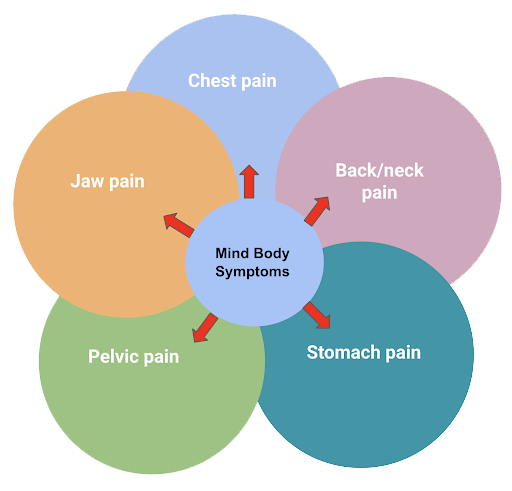Mind Body Syndrome
Up to 28 million adults in the UK live with chronic, unexplained pain, causing huge suffering and disability and sometimes permanently disrupting their lives.
If you are experiencing this, you are not alone.
Although there can be a physical cause which requires diagnosis and treatment, neuroscientists are now discovering the importance of psychological and social factors in a patient’s experience of pain.
Past and present experiences of stress and trauma make a person’s nervous system and brain adapt to be better prepared to react to future danger.
This can create a state of hypervigilance, affecting the way the brain detects danger, produces pain, how much pain is felt, and whether it becomes chronic.
The Mind Body Connection
Long-term, chronic stress and trauma can often create and increase our physical symptoms.
Pain in these areas are all examples of this:

Fibromyalgia, migraines, irritable bowel syndrome and dizziness can also become an expression of someone’s unresolved emotional distress.
Neuroplastic Pain
Our brains produce this pain because they are neuroplastic. Brains adapt and rewire themselves to keep us from what they perceive as danger.
The good news is that, just as our brain and nervous system can become too sensitive and over-reactive to otherwise normal sensations and activities, we can learn to calm our nervous system and train our brain to reduce or even eliminate chronic pain.
Your Pain Is Real
It’s important to emphasise that although your pain might be created by your brain, that it is still very real. Like phantom limb pain, the brain has rewired itself to produce pain which is ‘out of proportion to any observable injury or disease’ NICE (2021).
Among the most common neuroplastic illnesses, NICE (2021) names fibromyalgia, Chronic Regional Pain Syndrome (CRPS), chronic musculoskeletal pain, abdominal pain, and head pain.
Information Can Help Your Recovery
Understanding what is going on physically and psychologically, has been shown to make a big difference to a person’s recovery from chronic pain:
‘A Harvard back pain study (2021) showed that Mindfulness-Based Stress Reduction only moderately helps with chronic pain (25% become pain-free). When combined with education about neuroscience, learned neural pathways and getting a proper diagnosis, mindfulness leads to 63% of people becoming pain-free over 26 weeks. In other words, mindfulness is more powerful when combined with an understanding that the body is not broken, and that chronic pain can be 100% reversible’
Dr Howard Schubiner – Director of the Mind Body Medicine Center at Providence Hospital in Southfield, Michigan, Clinical Professor at Wayne State University and Michigan State University School of Medicine.

